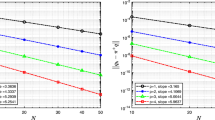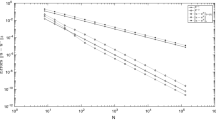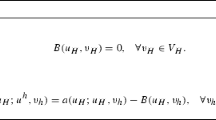Abstract
One particular strength of the boundary element method is that it allows for a high-order pointwise approximation of the solution of the related partial differential equation via the representation formula. However, the high-order convergence and hence accuracy usually suffers from singularities of the Cauchy data. We propose two adaptive mesh-refining algorithms and prove their quasi-optimal convergence behavior with respect to an a posteriori computable bound for the point error in the representation formula. Numerical examples for the weakly-singular integral equations for the 2D and 3D Laplacian underline our theoretical findings.













Similar content being viewed by others
References
Aurada, M., Ebner, M., Feischl, M., Ferraz-Leite, S., Führer, T., Goldenits, P., Karkulik, M., Mayr, M., Praetorius, D.: HILBERT—a MATLAB implementation of adaptive 2D-BEM. Numer. Algorithms 67(1), 1–32 (2014)
Aurada, M., Feischl, M., Führer, T., Karkulik, M., Praetorius, D.: Efficiency and optimality of some weighted-residual error estimator for adaptive 2D boundary element methods. Comput. Methods Appl. Math. 13(3), 305–332 (2013)
Aurada, M., Feischl, M., Führer, T., Karkulik, M., Melenk, J.M., Praetorius, D.: Local inverse estimates for non-local boundary integral operators. ASC Report 12/2015, University of Technology, Vienna (2015)
Binev, P., Dahmen, W., DeVore, R.: Adaptive finite element methods with convergence rates. Numer. Math. 97(2), 219–268 (2004)
Becker, R., Estecahandy, E., Trujillo, D.: Weighted marking for goal-oriented adaptive finite element methods. SIAM J. Numer. Anal 49(6), 2451–2469 (2011)
Carstensen, C.: An a posteriori error estimate for a first-kind integral equation. Math. Comput. 66(217), 139–155 (1997)
Carstensen, C., Feischl, M., Page, M., Praetorius, D.: Axioms of adaptivity. Comput. Math. Appl. 67(6), 1195–1253 (2014)
Cascon, J.M., Kreuzer, C., Nochetto, R.H., Siebert, K.G.: Quasi-optimal convergence rate for an adaptive finite element method. SIAM J. Numer. Anal. 46(5), 2524–2550 (2008)
Carstensen, C., Maischak, M., Stephan, E.P.: A posteriori error estimate and \(h\)-adaptive algorithm on surfaces for Symm’s integral equation. Numer. Math. 90(2), 197–213 (2001)
Feischl, M., Führer, T., Karkulik, M., Melenk, J.M., Praetorius, D.: Quasi-optimal convergence rates for adaptive boundary element methods with data approximation, part I: weakly-singular integral equation. Calcolo 51, 531–562 (2014)
Feischl, M., Führer, T., Karkulik, M., Melenk, J.M., Praetorius, D.: Quasi-optimal convergence rates for adaptive boundary element methods with data approximation, part II: hyper-singular integral equation. Electron. Trans. Numer. Anal. 44, 153–176 (2015)
Feischl, M., Karkulik, M., Melenk, J.M., Praetorius, D.: Quasi-optimal convergence rate for an adaptive boundary element method. SIAM J. Numer. Anal. 51(2), 1327–1348 (2013)
Gantumur, T.: Adaptive boundary element methods with convergence rates. Numer. Math. 124(3), 471–516 (2013)
Hsiao, G.C., Wendland, W.L.: Boundary integral equations. Springer, Berlin (2008)
Karkulik, M., Pavlicek, D., Praetorius, D.: On 2D newest vertex bisection: optimality of mesh-closure and \(H^1\)-stability of \(L_2\)-projection. Constr. Approx. 38(2), 213–234 (2013)
McLean, W.: Strongly Elliptic Systems and Boundary Integral Equations. Cambridge University Press, Cambridge (2000)
Mommer, M.S., Stevenson, R.: A goal-oriented adaptive finite element method with convergence rates. SIAM J. Numer. Anal. 47(2), 861–886 (2009)
Nochetto, R.H., Veeser, A.: Primer of adaptive finite element methods. In: Naldi, G. (ed.) Multiscale and Adaptivity: Modeling, Numerics and Applications. C.I.M.E. Summer School, Cetraro, Italy, July 6–11, 2009. Lecture Notes in Mathematics, vol. 2040, pp. 125–225 (2012).Springer, Berlin; Fondazione CIME Roberto Conti, Firenze
Smigaj, W., Betcke, T., Arridge, S., Phillips, J., Schweiger, M.: Solving boundary integral problems with BEM\(++\). ACM Trans. Math. Softw. 41, Article #6 (2015)
Sauter, S.A., Schwab, C.: Boundary element methods. Springer, Berlin (2011)
Stevenson, R.: Optimality of a standard adaptive finite element method. Found. Comput. Math. 7(2), 245–269 (2007)
Steinbach, O.: Numerical approximation methods for elliptic boundary value problems–finite and boundary elements. Springer, New York (2008)
Acknowledgments
The authors acknowledge support through the Austrian Science Fund (FWF) under Grant P27005 Optimal adaptivity for BEM and FEM-BEM coupling. MF and DP acknowledge the support of the FWF doctoral school Dissipation and Dispersion in Nonlinear PDEs, funded under Grant W1245. The research of TF is supported by the CONICYT project Preconditioned linear solvers for nonconforming boundary elements, funded under Grant FONDECYT 3150012.
Author information
Authors and Affiliations
Corresponding author
Rights and permissions
About this article
Cite this article
Feischl, M., Gantner, G., Haberl, A. et al. Adaptive boundary element methods for optimal convergence of point errors. Numer. Math. 132, 541–567 (2016). https://doi.org/10.1007/s00211-015-0727-4
Received:
Revised:
Published:
Issue Date:
DOI: https://doi.org/10.1007/s00211-015-0727-4




